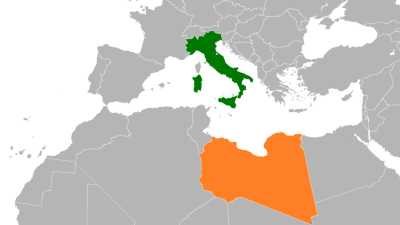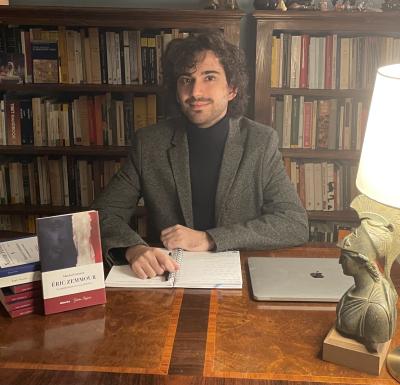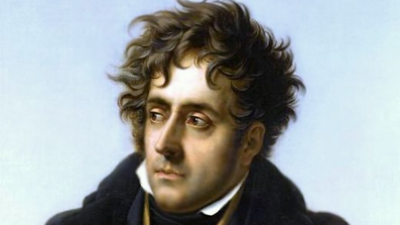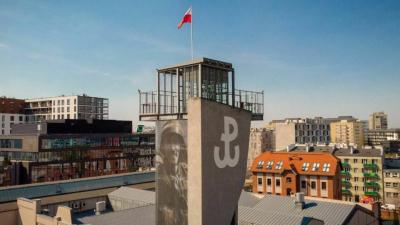On November 26, 1911 in Barga, the poet Giovanni Pascoli delivered a speech destined to remain in the annals of Italian history.
"The Great Proletarian has moved" – said to the applause of the audience the man who until then had been defined as a pacifist and moderate intellectual, referring to the tangible possibility that Italy would enter the war against the Ottoman Empire to find new fertile land and territories to repopulate with a huge migration of workers and peasants from the peninsula. For Pascoli, the Italian civilizing mission even had a unifying matrix for Italy, which would see every class and social class fight for the homeland after half a century of difficult unitary coexistence.
A discourse that would unconsciously shape the slow approach of Italy itself to a nationalist socialism that would find its definitive sublimation in Mussolini's fascism, the same one that saw colonialism as an instrument of oppression and glory.
From 1912, Libya became an Italian colony, the most important in North Africa until Italy's capitulation in World War II and the consequent liberation from authoritarianism.
The war theater of North Africa was in fact one of the bloodiest and most disastrous for the Axis powers, despite the inspiration of General Rommel, the fox of the desert.
Since 1947, a resolution of the Security Council of the newly formed United Nations sanctioned the reconquest of Libyan sovereignty over the territory, the end of the colonial government with the transfer of property and infrastructure from Italy to the government of Tripoli and the reparation of much of the damage caused by the war.
From that moment on, relations between Italy and Libya were marked by the poisons of the post-colonial legacy, exacerbated in 1969 by the seizure of power by Colonel Gheddafi.
A charismatic man of action and a bulwark of a narrative that saw Libya revolt against forms of subjection to Western powers, Gheddafi concretized his rise to power on September 1 1969, abolishing the monarchy of King Idris and his direct successor Hasan al-Senussi and proclaiming the Republic and the Council of Command of the Revolution, with a Nasserist memory.
Gheddafi cemented internal consensus through a renewed pan-Arabist nationalism, whose ideological matrices are contained in the precepts of the Colonel's Green Book.
In the last decades of the twentieth century, bilateral relations between the two countries were the ones that paid the price, with the new Libya claiming the need for further reparation funds and post-war reparations.
In Libya, Italy had signed numerous bilateral agreements with the previous monarchy, thanks to the excellent dynamism of ENI and its best-known face, the energy tycoon Enrico Mattei, who since 1956 has sought a privileged relationship with Tripoli, with its importance not only geographically but also politically and energetically.
1970 was instead the year of the confiscation of assets and the mass expulsion of Italian-Libyans. The choice of Gheddafi, who followed the spirit of emancipation that Nasser's disciple wanted to pursue after taking power, overturned many of the contents of the UN resolution of the second post-war period, which bound the new Libyan government to respect minorities and citizens of Italian origin still residing within national borders.
The mass expulsion put an end to Italy's post-colonial legacy and led to years of unresolved disputes between the two realities, further exacerbated by the head-on clash between the Western bloc and the Arab world during the years of terrorism.
In 1986, with Bettino Craxi's historic tip to the Libyan leader, Italy saved Gheddafi's life from the bombing of Tripoli by the Reagan administration.
A choice that in retrospect laid the foundations for a new rapprochement between Rome and Tripoli that resulted in the Dini-Mountasser agreements of 1998.
However, it was with Silvio Berlusconi that Italy managed to establish itself again as a key and strategic partner of Gheddafi's Libya on the shores of the Mediterranean.
In 2008, the two leaders signed the Treaty of Benghazi. An agreement that elevated relations between the two countries to a potential partnership through closer cultural and economic cooperation and a joint fight against terrorism and irregular migration flows.
Following a histrionic visit to the capital, also animated by numerous protests and reminders by the Colonel to Omar al-Mukhtar (historic leader of the front of resistance to the occupation of Libya by the Italian royal troops) Gheddafi confirmed the reconciliation between the two countries on the basis of the contents of the key component of the Treaty of Benghazi, renamed "The closure of the past".
It was through the suture of the dramas of the twentieth century that Berlusconi and his counterpart continued to cement energy and economic cooperation agreements, which gave Italy a position as a privileged interlocutor with the Tripoli regime.
A diplomatic idyll that would be short-lived with the outbreak of the civil war in 2011 and the execution of Gheddafi, strongly desired by the Western bloc despite the enormous reticence of Berlusconi's government.
Fears confirmed by the unfortunate outcomes of the conflict, capable not only of damaging Italian interests in the area but of throwing Libya itself into chaos for the following decade.
On the rubble of hatred and opposition between loyalists and militiamen, Libya is still a land of conflict and is divided between two distinct political realities between Tripoli and Benghazi.
Further attempts at rapprochement between Italy and Libya took place with the Gentiloni’s government and Minniti's diplomatic action on the bilateral cooperation front to curb migration flows to Italy and the attempt during Giuseppe Conte's first government in 2018 to bring Haftar and Sarraj to the same diplomatic table. With the Italian military disengagement, the geopolitical predominance of the area was cemented by Erdogan and Turkey, which supported the defense of Tripoli against Haftar.
Today, after Draghi's parenthesis, the Meloni government seems to want to insist on bilateral cooperation with Libya for anti-immigration and energy-related policies.
The ambitious Mattei Plan sees the countries of the northern shore of Africa as privileged partners and could inaugurate a new phase of rapprochement between two realities that were once distrustful, divided and then united thanks to the close interpersonal relationships of two charismatic leaders such as Berlusconi and Gaddafi.
Cooperation between the two realities could be decisive in the face of a stabilization of the Mediterranean geopolitical theater towards which Erdogan, Putin and Xi Jinping are looking carefully through the lenses of the African continent.
Italy and Libya, after all, have linked for over a century two histories characterized by unpredictable hairpin bends of rise, decline and rebirth.
Today, the future of relations between the two countries remains a great and geopolitically unpredictable unknown, while the spectre of Colonel Gheddafi continue to hover over Libya torn apart by the effects of civil war.
Read also
Nawrocki's existential victory revives the Polish right-wing
These have been difficult years for the Polish right-wing. After returning to the center of the geopolitical chessboard thanks to the dynamism of the Morawiecki government in times of war on the borders of Eastern Europe, Donald Tusk's progressive coalition had prevailed in the October 2023 elections, beginning a progressive process of demolition of the institutional structures cemented by the Law and Justice party over the years.
Alarico Lazzaro
Alarico Lazzaro – Karpacz Economic Forum 2024 Speech
Good morning everyone and thanks for invitation to the Karpacz Economic Forum, dedicated this year to artificial intelligence and the youth leadership of the future.
Alarico Lazzaro
Law and Justice and the Importance of Poland's Historical Memory
On July 31, 2004, the Museum of the Uprising was inaugurated in Warsaw, decades after its establishment and years of work for its construction.














Comments (0)